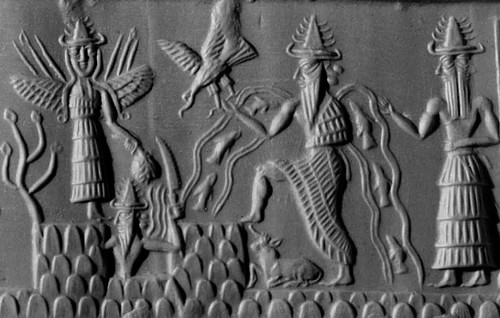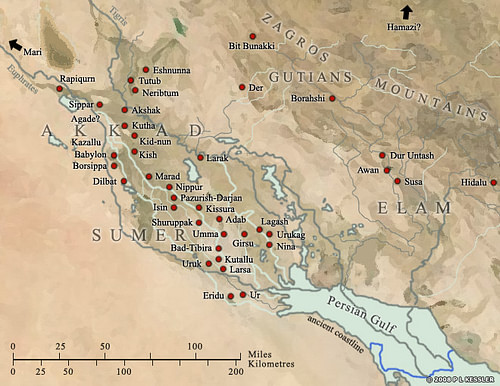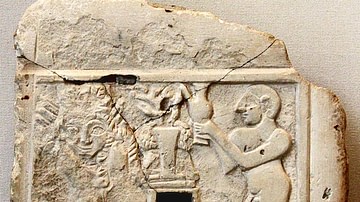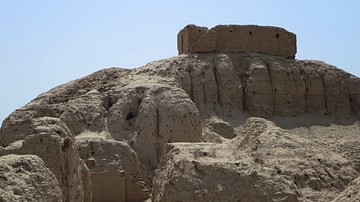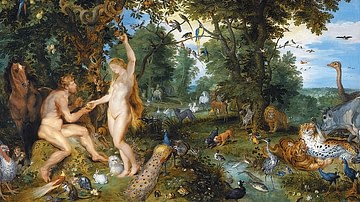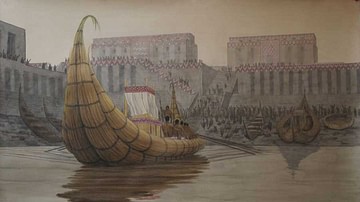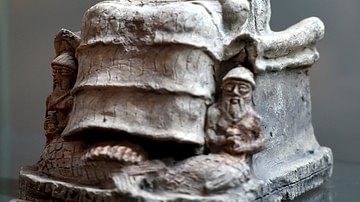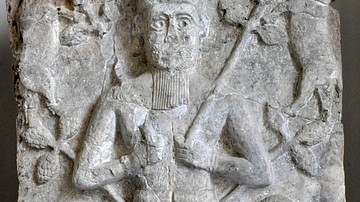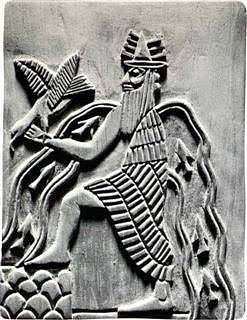
Enki (also known as Ea, Enkig, Nudimmud, Ninsiku, Nissiku) was the Sumerian god of wisdom, fresh water, intelligence, trickery and mischief, crafts, magic, exorcism, healing, creation, virility, fertility, and art. Iconography depicts him as a bearded man wearing a horned cap and long robes as he ascends the Mountain of the Sunrise.
In this image, flowing streams run from his shoulders, emphasizing his association with life-giving water, while trees representing the male and female principle stand in the background. The streams are interpreted as the Tigris and Euphrates rivers which, according to one myth, were formed from Enki's semen. His name means "Lord of the Earth" and his symbols are the fish and the goat, both representations of fertility, while his epithets Nudimmud, Ninsiku, and Nissiku are thought to mean "prince."
Originally, Enki (then known as Enkig) was a Sumerian deity of fresh water and patron of the city of Eridu, considered by the Mesopotamians the first city established at the beginning of the world where the gods established law. The god first appears in written works during the Early Dynastic Period III (2600-2334 BCE) and was established as an important god of the Akkadians by c. 2400 BCE who knew him as Ea.
Excavations at Eridu, however, have uncovered evidence of a tradition of shrines to Enki dating back to the founding of the city c. 5400 BCE. At Eridu he was known as Enki and later, at Akkad, as Ea; the two names are used interchangably for the same deity as is the Babylonian name Nudimmud. Enki was known as Ninsiku only in his aspect as patron of crafts and art, especially objects devoted to divine subjects.
Genealogy & Offspring
Enki was the son of Anu, the sky god, in Sumerian and Akkadian mythology and the son of Apsu, the primordial father, in Babylonian texts. He is also referred to as the son of the goddess Nammu, a primordial mother goddess who gave birth to the earth and heavens. Enki's wife was Ninhursag (also known, among many other names as Ninmah and, originally, as Damgalnuna, the Assyrian Damkina) and their sons were Asarluhi (god of magical knowledge), Enbilulu (god of canals and dikes), the human sage Adapa, and the king of the gods, Marduk (who would later absorb the qualities of Asarluhi).
They also had eight children born of Ninhursag's efforts to heal Enki in the myth Enki and Ninhursag:
- Abu (god of plants and growth)
- Nintulla (Lord of Magan and precious metal)
- Ninsitu (goddess of healing, wife of healing-god Ninazu)
- Ninkasi (goddess of beer)
- Nanshe (also Nanse, social justice, fertility, divination, and the interpretation of dreams)
- Azimua (goddess of healing, wife of underworld deity Ningishida)
- Emshag (Lord of Dilmun, god of fertility)
- Ninti (goddess of the rib, giver of life)
Enki is also often depicted as the father (or uncle) of one of the most popular and enduring deities, Inanna, goddess of war, sexuality, passion, fertility, love, and prostitutes. He had a twin brother, Adad (also known as Ishkur), god of weather and storms.
Appearance in Literature
There are a number of Mesopotamian stories, legends, prayers, and royal inscriptions in which Enki plays a major role. He is famously depicted in the works concerning Ninhursag (Ninmah) such as Enki and Ninhursag and Enki and Ninmah both of which concern the creation of the world and humanity. Enki's Journey to Nippur is another origin myth explaining how the god created Eridu and ordained certain musical instruments used in festivals in ancient Mesopotamia.
In the Enuma Elish, the Babylonian epic of creation, Enki is the father of the champion Marduk, who defeats the forces of chaos, and is co-creator of the world with his son. Enki also appears in the works The Atrahasis, The Marriage of Ereshkigal and Nergal, Inanna and The God of Wisdom, The Descent of Inanna, Enki and the World Order, Enmerkar and the Lord of Aratta, The Epic of Gilgamesh, and others.
He was one of the most important deities in the Mesopotamian Pantheon along with Anu (Lord of Heaven), Enlil (Supreme Lord of Air), and Inanna. Along with Anu and Enlil, Enki made up an early Mesopotamian triad governing the high heavens, atmosphere, and earth. He is also listed among the earliest seven Sumerian deities as one of the Seven Divine Powers: Anu, Enki, Enlil, Inanna, Nanna, Ninhursag, and Utu-Shamash.
Mythological Origin from Enuma Elish
According to the Babylonian Enuma Elish (c. 1100 BCE), Enki was the oldest son of the first gods, Apsu and Tiamat. In the beginning of time, the world was undifferentiated swirling chaos from which separated Apsu, the male principle personified by fresh water and Tiamat, the female principle defined by salt water. Apsu and Tiamat gave birth to the younger gods but these deities had nothing to do and so amused themselves as best as they could. Their constant noise distracted Apsu and interrupted his sleep and so, after consulting with his vizier, he decided to kill them.
Tiamat overheard their discussion and was horrified by the plan and so whispered it to her son. Enki considered various actions and their consequences and then proceeded with the one he thought best: he put his father into a deep sleep and then killed him. Tiamat never considered such a possibility and disowned her children. She then raised an army of demons and monsters, led by her consort and champion Quingu (sometimes Kingu). This army of the older gods defeated Enki and the younger gods in battle each time they met until the younger group was driven back and began to lose hope.
At this point Enki's son Marduk stepped forth with an offer: if the gods would make him their king, he would lead them to victory. Prior to this, there had been no general overseeing the operations but each god took a turn at command. Once Marduk was elected king, he met Quingu in single combat and defeated him and then shot Tiamat with an arrow so great it split her in two.
From her eyes ran the tears which would become the Tigris and Euphrates rivers and her body was used by Marduk to fashion the earth. Quingu, and other gods who had encouraged Tiamat's war, were executed and Quingu's body used to create human beings. Marduk consulted with Enki on all these choices and so Enki is often credited as co-creator of the world and life.
Enki in The Atrahasis
The Akkadian/Babylonian story of The Atrahasis (c. 17th century BCE) gives another version of the creation but, still, Enki plays a pivotal role. In this story, the elder gods live a life of leisure and pleasure while making the younger gods do all the work in maintaining creation. The younger gods have no time to rest because there is always so much to do and so Enki proposes that they create lesser beings who will be co-workers with them.
They have no idea what to make these new creatures out of until one of the gods, We-llu (also llawela), volunteers himself as a sacrifice and is killed. His flesh, blood, and intelligence are kneaded into clay by the mother goddess Ninhursag from which she creates seven male and seven female human beings. These fourteen new creatures are exceptionally fertile and soon there are hundreds, and then thousands, of people on the earth all doing the work which once occupied the younger gods.
At first, these people are exactly what the gods had hoped for but, as they grow in number, they become louder and more and more of a problem. Their constant noise and difficulties disturb the sleep of Enlil, king of the gods, and distract him from both his daily tasks and his leisure so he decides to cut down the population through a series of plagues. He sends a drought, then pestilence, then famine and, each time, the people appeal to their father-god Enki, the one who first conceived of them, and he helps them by telling them what they should do to return the earth to balance and productivity and their communities to full health.
Enlil is frustrated as now there seem to be even more people than when he first tried to get rid of them. He convinces the other gods to allow him to unleash a great flood which will destroy humanity and he is powerful enough to get them all to agree. Enki recognizes the cruelty and injustice of this plan but cannot deter Enlil so he goes to earth and finds an honest man, Atrahasis, one who has always been both wise and kind and has devoted himself to Enki piously. Enki whispers to him to build an ark and enter it with two of every kind of animal.
Atrahasis completes his mission just as the flood begins. The people cry out for help from the gods but no help is offered. Ninhursag weeps for the people and is inconsolable and the other gods also mourn but no one can stop the flood. Enlil recognizes that this flood may not have been the best idea but it is too late now; everyone on earth is dead.
The flood waters subside, the ark comes to rest, and Enki whispers to Atrahasis that the time has come for him to open the ship and make sacrifices to the gods. Atrahasis does so and the sweet smell of his sacrifice floats up to heaven from which Enlil looks down to see someone has survived. He instantly knows Enki is behind this and, even though he was only just regretting what he had done, he focuses all his fury on him.
Enki explains himself, however, and shows how good and kind a man Atrahasis is and directs them all to the sweet sacrifice. The gods are pleased and descend to earth to eat the sacrifice and then Enki proposes a new plan: the gods will create beings who are less fertile: infants will be carried away by demons, women will suffer miscarriages or be infertile, other women will be consecrated to the gods and remain perpetual virgins.
Further, humans will not be given very long life spans and, in the time they do live, there will be opportunities daily for their death from many different causes. The gods agree to this proposal; Atrahasis, the last of his kind, is spirited away to the lands of the blessed and Ninhursag creates the new creatures.
Enki as Trickster God
In both of these stories, Enki acts in the best interest of the community even if that community cannot appreciate it. In the Enuma Elish he defies his mother's hopes in killing Apsu but must do so for the greater good and, in The Atrahasis, he saves one good man to inspire Enlil to give humanity a second chance to live. In most of the other stories he is shown in this same way. In The Marriage of Ereshkigal and Nergal, for example, he arranges events so that Nergal, god of war, will be held in the underworld for six months out of the year, thus preventing warfare and strife during that time.
In The Descent of Inanna he contrives for his daughter's (or niece's) rescue from the underworld after she is killed by her sister Ereshkigal by sending two clever demons to trick the Queen of the Dead into giving them Inanna's corpse. He is shown in the story Inanna and the God of Wisdom as possessor of the meh, the laws and powers concerned with all of life and the gifts of civilization - the possessions of the gods alone - which he allows Inanna to take from him during a drunken party.
Although he sends various forces after her to re-capture the meh and return them to him, it seems Inanna gets away with her stolen treasures fairly easily. In this, Enki is seen as he is in other works concerning Inanna: as the father of a daughter who would do anything for her, even if it may not seem the wisest or even the fairest choice under the circumstances.
In The Descent of Inanna, after all, Inanna causes her own problems and it is actually Ereshkigal who is wronged and should be aided. In helping Inanna, however, Enki restores balance to the world and, again, makes his choice based on the good of the many. When he allows Inanna to take the meh, he knows she will give the gifts of civilization to humanity just as he knows that the other gods expect him to keep them out of human hands.
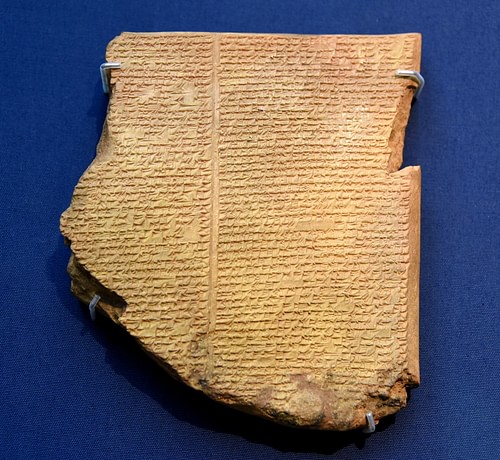
As a trickster god, Enki reveals his wisdom - and so enlightens others - through actions which may not make sense on the surface. This is the case when he allows himself to get drunk and lets Inanna have the meh but also in The Epic of Gilgamesh when he consents to the death of Enkidu, best friend of the hero Gilgamesh. Enkidu and Gilgamesh have just returned from another triumph when Inanna (known as Ishtar in the story) tries to seduce the hero and Gilgamesh, listing the many other lovers she has had who met with bad ends, refuses her.
Inanna sends her sister Ereshkigal's husband, Gugulana (the bull of heaven) to destroy Gilgamesh's realm and Enkidu kills him. For raising his hand against a god, Enkidu must die. Enki consents to this - even though he recognizes Inanna caused the problem - because human beings must not think so highly of themselves that they will challenge the gods. More importantly, however, Enki realizes that Enkidu's death will introduce Gilgamesh to loss and this will lead him to an exploration of the meaning of life which will make him a deeper and more complete individual.
Even in Enki and Ninhursag, where he seduces his grown daughters because they remind him of his wife, Enki is portrayed sympathetically. He is punished for his transgressions which, it is made clear, he was guilty of only out of his great love for Ninhursag and a kind of enchantment he fell under because of missing her. His role as Trickster God is evident in this as his various mis-steps and sins result in the birth of deities favorable to humanity.
This same is true in Enki and Ninmah in which Ninmah challenges him to a game while they are drinking beer and Enki manages to best her by creating a being she can do nothing to improve upon. His mischief in all these tales is evidence of his wisdom and his desire to do his best for humanity.
Patron of Eridu & Worship
Enki as patron of the city or Eridu is significant to his role as god of wisdom. Eridu was thought to be the first city created by the gods upon which order and law was conferred at the beginning of time and was later known as the "city of the first kings". Founded c. 5400 BCE, Eridu would remain an important religious center for thousands of years and serve in stories and legends about a "golden age" in the same way that later Hebrew writers would cite a Garden of Eden.
Excavations at the city have uncovered shrines to Enki built and re-built at the same location over thousands of years. Even after the god was widely worshipped elsewhere, he continued to be associated with Eridu and the abzu (also absu), the subterranean waters there. Enki was worshipped primarily at his temple known as E-abzu (House of the Abzu) and E-engur-ra (House of the Subterranean Waters), described and praised in Enki's Journey to Nippur in which he receives the blessings of Enlil for the city after its creation.
As with all other important Mesopotamian gods and goddesses, priests tended to the god's statue, temple-ziggurat, and temple complex which served the people in many different ways. The gods' temples were houses of healing, counseling centers, distribution centers, and holy sites. There were no temple services as one would recognize them in the present day and people mainly interacted with the gods during festivals, through communion with the lesser priests, or at home through private rituals.
At Eridu, Enki presided over the abzu but also over the mystical aspects of this primordial marsh from which the city - and life - was thought to have risen. Attended by his minister Isimud, Enki also had assorted creatures at his service such as giants, demons (both protective and destructive), and other mystical beings. Mermen and mermaids were thought to inhabit the watery depths of the abzu beneath the city while the Seven Sages (the abgal) lived with Enki in his palace.
In every story or legend, Enki is associated with the heights and depths of universal understanding and is always seen as a friend of humanity. When given a choice between serving the will of the gods or the needs of the people, Enki always chose human interests and always the path of compassion, forgiveness, and wisdom.
